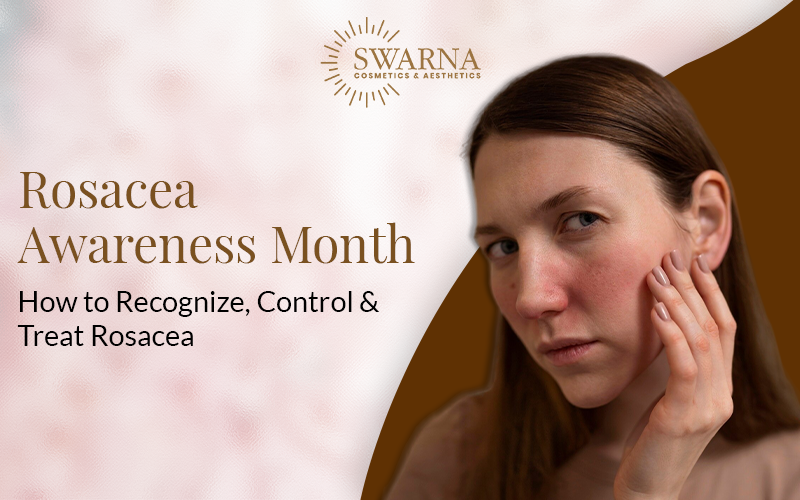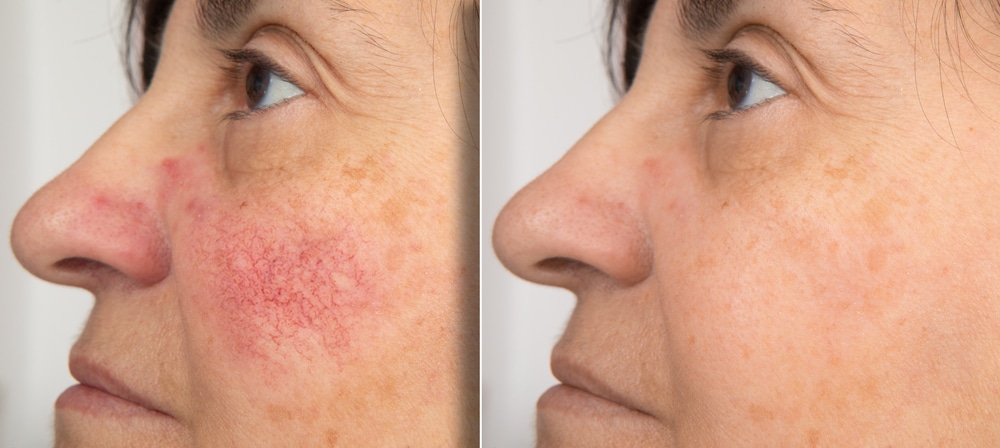
Rosacea Awareness Month: Understanding, Managing & Treating Rosacea
Every April, we recognize Rosacea Awareness Month, an important time to shine a light on a chronic skin condition that affects millions but is still widely misunderstood. If you’ve ever experienced persistent facial redness, bumps, or visible blood vessels, you may be dealing with more than just sensitive skin — it could be rosacea.
In this blog, we’ll take a deep dive into what rosacea is, explore its symptoms, causes, bust some common myths, and share tips on the right diet and treatment options. Plus, we’ll shed light on global and Indian rosacea statistics, bringing awareness to this chronic but manageable skin condition.
Rosacea: A Global Skin Concern
Rosacea is more common than you might think.
- Worldwide, over 415 million people are estimated to be affected by rosacea.
- In the United States alone, over 16 million people live with the condition.
- In India, precise statistics are limited due to underdiagnosis and lower awareness, but dermatologists are observing a rising trend, especially in urban areas due to pollution, lifestyle changes, and stress.
What Is Rosacea?
Rosacea is a chronic inflammatory skin condition that primarily affects the face—especially the cheeks, nose, forehead, and chin. It often begins with facial flushing and can progress to persistent redness, visible blood vessels, and even acne-like bumps.
Symptoms of Rosacea
The symptoms of rosacea can vary from person to person, but common signs include:
- Persistent facial redness or flushing
- Visible blood vessels (telangiectasia)
- Bumps and pimples resembling acne
- Burning or stinging sensation
- Dry, rough, or scaly skin
- Swollen or bulbous nose (more common in men, known as rhinophyma)
- Eye irritation (ocular rosacea)
Early diagnosis can help prevent rosacea from worsening over time.
What Causes Rosacea?
The exact cause of rosacea is still unknown, but researchers believe it’s a combination of:
- Genetics – A family history can increase risk.
- Immune system factors – An overreaction to certain microbes on the skin.
- Environmental triggers – Such as sunlight, wind, extreme temperatures, and spicy foods.
- Demodex mites – Microscopic mites that live on the skin may play a role in some cases.
- Abnormal blood vessels – Especially around the central face.
Rosacea is not contagious, and it’s not caused by poor hygiene — a common misconception.

Common Myths About Rosacea
Let’s bust some of the common myths surrounding rosacea:
- Myth: Rosacea is just adult acne.
✔️ Truth: While it may resemble acne, rosacea is a different condition that doesn’t respond to standard acne treatments. - Myth: Only fair-skinned people get rosacea.
✔️ Truth: Rosacea can affect all skin tones—though it may be underdiagnosed in people with darker skin. - Myth: It’s caused by poor hygiene.
✔️ Truth: Rosacea is not caused by how clean your face is—it’s a medical condition with internal triggers. - Myth: Rosacea is caused by alcohol.
✔️ Truth: Alcohol can trigger flare-ups in some people, but it’s not the root cause. People who never drink can still develop rosacea. - Myth: There’s a cure for rosacea.
✔️ Truth: Rosacea has no known cure, but it can be effectively managed with proper skincare, medication, and trigger awareness.
Diet Tips for Rosacea Management
Diet can play a major role in managing rosacea symptoms. Here’s what to eat and avoid:
✅ Foods to Include:
- Anti-inflammatory foods: leafy greens, berries, turmeric
- Omega-3-rich foods: salmon, flaxseeds, walnuts
- Probiotics: yogurt, kefir, kimchi
- Hydrating foods: cucumber, watermelon
❌ Foods to Avoid:
- Spicy foods
- Alcohol (especially red wine)
- Hot beverages
- Caffeine
- Processed and sugary foods
Keeping a food journal can help you track what triggers your flare-ups.
Rosacea Treatments
While there is no permanent cure, rosacea can be managed with the right treatments:
Medical Options:
- Topical creams
- Oral antibiotics
- Laser therapy
- Isotretinoin
Lifestyle & Skincare Tips
- Use gentle, fragrance-free skincare products
- Apply broad-spectrum sunscreen daily
- Identify and avoid personal triggers
- Keep a rosacea diary to track flare-ups
- Manage stress through yoga, meditation, or therapy
Why Rosacea Awareness Month Matters
Rosacea Awareness Month, observed every April, is a global initiative to educate the public about this often misunderstood condition.
The campaign aims to:
- Promote early diagnosis and treatment
- Dispel myths and stigma
- Encourage open conversations
- Empower people with rosacea to seek help and support
This month is the perfect opportunity to spread awareness and support those silently suffering. Whether it’s sharing your story, talking to a loved one, or simply learning more, every small step counts.
Final Thoughts
Rosacea can be emotionally and physically frustrating, but with awareness, education, and support—it is absolutely manageable. This Rosacea Awareness Month, let’s help spread the word, break the myths, and empower those living with this condition.
Remember, early diagnosis and personalized care are key. If you or someone you know is experiencing symptoms, don’t wait—consult a skin specialist today.
At Swarna Cosmetics and Aesthetics, the best skin clinic in Jaipur, we specialize in advanced skin care and provide customized treatments for rosacea and other skin conditions. Our team is led by some of the best dermatologists, committed to helping you achieve calm, healthy, and confident skin.
Visit us today and take the first step toward understanding and managing rosacea with expert guidance and care.